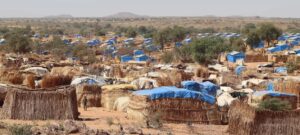
Amidst the barren landscape in eastern Chad, there is a sea of white tents stretching to the horizon. Women in colorful garments huddle with their children in the shade of the tent canopies, waiting. Here live those who have escaped the horrors in Sudan. “They attacked us for three days,” said mother Roukaya, recounting the story to Reuters news agency. The armed men went from door to door, rounding up the men and killing them. “They dragged my children’s father onto the streets and shot him. They took everything from me, and I had to flee to Chad with the children,” she said.
The accounts of atrocities from the war in Sudan continue unabated. Particularly affected is the Darfur region in western Sudan, where ethnic cleansing has reportedly been taking place for months. “Some victims died in mass executions or were burned alive,” UN spokesperson Jeremy Laurence reported weeks ago. Women and girls recount episodes of sexual violence, and thousands of people have been displaced.
Millions of people on the run
The number of refugees in Sudan totals in the millions: Most people are displaced within Sudan itself, but neighboring countries such as Chad, Egypt, Ethiopia, and South Sudan have also taken in millions of refugees. The situation is particularly dire in South Sudan. The war-torn country ranks among the ten poorest countries in the world, lacking in state structures, and large portions of the population are starving. Now, refugees from Sudan are adding to the crisis, some of them returning from one misery only to stumble into another.
The situation in Chad is also extremely difficult, not to mention the situation within Sudan, says Hashim Bilal from Welthungerhilfe (World Hunger Aid). “We are talking about 7.4 million people who have lost their homes. Currently, there is no other country in the world where so many people have been internally displaced as in Sudan.” However, conflicts like Gaza or Ukraine receive much more attention, Bilal laments. “We need funds for Sudan. The international humanitarian aid plan was only 30% funded last year. And now we’re already in 2024.”
Humanitarian organizations face significant challenges in delivering aid to Sudan as the fighting has spread throughout the entire country. Medical services are said to have collapsed, and according to Hashim Bilal, more than 15 million people are in need of food assistance. “We discuss daily where we can go and where we can’t, so that we don’t end up in the wrong place at the wrong time and endanger our staff. Some regions are completely inaccessible. Every day, we have to decide anew.”
Army battles RSF militia
In Sudan, the troops of Army Chief and de facto ruler Abdel Fattah al-Burhan have been fighting the RSF militia, commanded by his former deputy Mohamed Dagalo, aka Hemeti, since April of last year. The two men are vying for power in the country, and the fighting is devastating the entire nation.
The RSF militia – “Rapid Support Forces” in abbreviation – has been accused of committing massive human rights violations. Its leader, Hemeti, appears to be working on his image and positioning himself as a potential president of the country. He has recently stopped wearing a uniform and instead appears in a suit. He has been received as a statesman in several African countries.
The aspiring president is said to be supported by the United Arab Emirates, according to reports. In interviews, he presents himself as conciliatory and apologizes to the people. “We didn’t start this war. Nevertheless, I apologize to every child, every woman. I tell them: Don’t lose hope! I hope that peace will prevail soon,” Hemeti said.
A successful peace negotiation is still nowhere to be seen
Comforting words while the killings continue? So far, there is no sign of successful peace negotiations. The warring parties blame each other for the failure of all talks. German Foreign Minister Annalena Baerbock has now placed the Sudanese conflict on her agenda, insisting that it should not become a “forgotten crisis.”
However, that seems to have already happened – what troubles the people in Sudan and local aid organizations the most, besides the war itself, is the feeling of being forgotten by the international community.